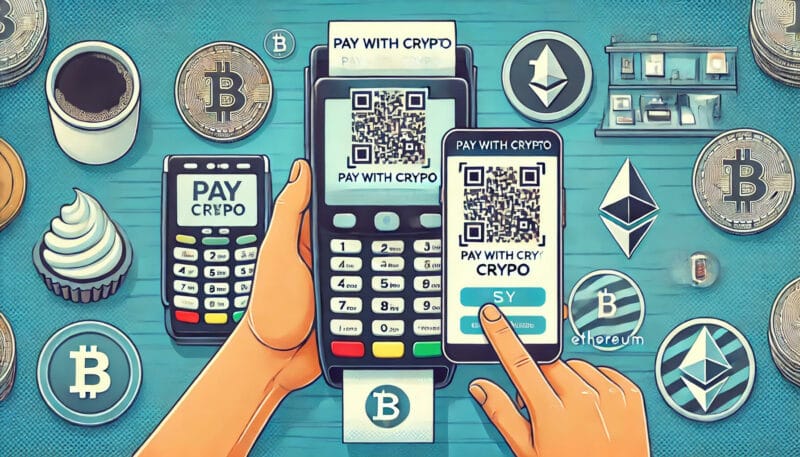1. Introduction: The Rise of Cryptocurrency in Daily Life
Cryptocurrency, once seen primarily as an investment or speculative asset, is increasingly becoming a viable option for everyday transactions. As more merchants and service providers accept digital currencies, using cryptocurrency for daily payments is easier and more practical than ever. Whether you’re buying a cup of coffee, shopping online, or paying bills, cryptocurrency offers a new way to manage and spend your money. This guide will walk you through the steps to start using cryptocurrency in your daily life, including setting up a wallet, making transactions, and finding places that accept crypto.
Why Use Cryptocurrency for Everyday Transactions?
Cryptocurrencies offer several benefits, including lower transaction fees, enhanced privacy, and the ability to make payments across borders without the need for traditional banking systems. Additionally, using crypto for daily transactions allows you to diversify how you spend your money, often benefiting from faster and more secure transactions.
2. Getting Started: Setting Up a Cryptocurrency Wallet
Before you can start using cryptocurrency for everyday transactions, you need to set up a cryptocurrency wallet. A wallet is a digital tool that stores your cryptocurrencies and allows you to send, receive, and manage your funds. There are different types of wallets, including:
- Hot Wallets:
These are online wallets that are always connected to the internet, making them convenient for everyday transactions. Examples include mobile wallets and web-based wallets like MetaMask and Trust Wallet. - Cold Wallets:
These are offline wallets that provide higher security by keeping your funds disconnected from the internet. They are best suited for storing large amounts of cryptocurrency that you don’t need to access frequently. Examples include hardware wallets like Ledger and Trezor.
Steps to Set Up a Wallet:
- Choose a Wallet: Decide whether you want a hot wallet (more convenient for daily use) or a cold wallet (more secure).
- Download the Wallet: If you’re choosing a hot wallet, download the app or extension from a trusted source. For a cold wallet, purchase a hardware device from the official manufacturer.
- Set Up Your Wallet: Follow the instructions to set up your wallet, including creating a strong password and writing down your recovery phrase. Never share your recovery phrase with anyone.
- Fund Your Wallet: Transfer cryptocurrency from an exchange or another wallet into your new wallet to start using it for transactions.
3. Where Can You Spend Cryptocurrency?
Once your wallet is set up, you’re ready to start spending cryptocurrency. While not all businesses accept crypto, the number of merchants and service providers that do is steadily increasing. Here are some common places where you can use cryptocurrency for everyday transactions:
3.1 Online Shopping
Many online retailers now accept cryptocurrency as a form of payment. Popular platforms like Overstock, Newegg, and Shopify merchants allow you to pay for goods and services with Bitcoin, Ethereum, and other cryptocurrencies. Some websites also integrate with payment processors like BitPay, which converts crypto into fiat currency for the merchant, making it easier to use crypto for online purchases.
- Popular Online Retailers Accepting Crypto:
- Overstock
- Newegg
- Shopify (selected merchants)
- Microsoft (for digital content)
3.2 Food and Beverage
Several restaurants and cafes, particularly in tech-savvy cities, accept cryptocurrency payments. Companies like Starbucks and Burger King have tested crypto payments in some locations, and you can find independent cafes and restaurants that accept Bitcoin or other digital currencies. Additionally, services like BitPay and Flexa enable you to pay at various food outlets by converting your crypto into fiat at the point of sale.
- Examples of Food and Beverage Chains Accepting Crypto:
- Starbucks (via the Bakkt app)
- Burger King (selected locations)
- Subway (selected locations)
- Pizza Hut (in Venezuela)
3.3 Travel and Accommodation
The travel industry is another area where cryptocurrency usage is growing. You can book flights, hotels, and car rentals using crypto through various platforms. For example, Expedia, CheapAir, and Travala allow you to pay for your travel arrangements with Bitcoin and other cryptocurrencies.
- Travel Companies Accepting Cryptocurrency:
- Travala
- CheapAir
- Expedia (through Travala)
- airBaltic
3.4 Bill Payments
Some services allow you to pay your utility bills, credit card bills, and even taxes with cryptocurrency. These services convert your crypto into fiat and pay your bills on your behalf. Services like BitPay and CoinGate offer bill payment options for users looking to manage their finances with cryptocurrency.
- Bill Payment Services Accepting Crypto:
- BitPay
- CoinGate
- CoinPayments
4. Tips for Using Cryptocurrency in Everyday Transactions

4.1 Keep Track of Transaction Fees
While cryptocurrency transactions typically have lower fees than traditional banking methods, the fees can vary depending on the network’s congestion and the cryptocurrency you use. Always check the transaction fees before making a payment to ensure you’re not paying more than necessary.
- Key Tips:
- Check Fees: Use a wallet that displays the transaction fees before confirming a payment.
- Use Faster Networks: Some cryptocurrencies, like Litecoin or Bitcoin Cash, offer lower fees and faster transaction times compared to Bitcoin.
4.2 Stay Updated on Tax Implications
In many countries, using cryptocurrency for purchases is considered a taxable event, as it’s seen as selling an asset. This means you may need to report any gains or losses on your crypto transactions when you file your taxes. Be sure to keep detailed records of your transactions and consult with a tax professional to ensure compliance with local regulations.
- Key Tips:
- Keep Records: Track all your crypto transactions, including the value at the time of purchase and any gains or losses.
- Consult a Professional: Get advice from a tax expert familiar with cryptocurrency regulations in your country.
4.3 Protect Your Privacy
Cryptocurrency transactions are pseudonymous, meaning they don’t directly reveal your identity, but they are still traceable on the blockchain. If privacy is a concern, consider using privacy-focused cryptocurrencies like Monero or Zcash, or use mixing services that enhance the anonymity of your transactions.
- Key Tips:
- Use Privacy Coins: Consider using cryptocurrencies designed with privacy in mind.
- Mixing Services: Use reputable mixing services to obscure the transaction history if privacy is critical.
4.4 Be Aware of Price Volatility
Cryptocurrencies are known for their price volatility. The value of your crypto can fluctuate significantly within a short period, affecting the purchasing power of your digital currency. If you’re concerned about volatility, consider using stablecoins, which are pegged to the value of a fiat currency like the US dollar.
- Key Tips:
- Use Stablecoins: Consider using stablecoins like USDT or USDC for transactions to avoid volatility.
- Monitor Prices: Check the current price of your cryptocurrency before making a purchase.
5. The Future of Everyday Crypto Transactions
As cryptocurrency adoption grows, we can expect to see more businesses accepting crypto payments, as well as improvements in the infrastructure supporting these transactions. Developments in areas such as the Lightning Network for Bitcoin and Ethereum 2.0 aim to reduce transaction fees and increase speed, making crypto payments more practical for everyday use. Additionally, the integration of cryptocurrency with digital wallets and payment apps, such as PayPal and Venmo, suggests that using crypto for daily transactions will become even more accessible in the near future.
- Key Trends:
- Increased Adoption: More businesses and services are expected to accept cryptocurrency payments.
- Improved Infrastructure: Innovations like the Lightning Network and Ethereum 2.0 will make crypto payments faster and cheaper.
- Integration with Traditional Payment Systems: The integration of crypto into popular payment apps will make it easier for people to use digital currencies in their daily lives.
Conclusion: Embracing Cryptocurrency in Everyday Life
Cryptocurrency is no longer just a speculative investment; it’s increasingly becoming a viable option for everyday transactions. From buying coffee to paying bills, using cryptocurrency in your daily life offers numerous benefits, including lower fees, faster transactions, and increased privacy. However, it’s essential to be aware of the challenges, such as price volatility and tax implications, and to take steps to manage these risks. As adoption continues to grow, the future looks bright for those who choose to embrace crypto in their everyday lives.
For more insights and detailed guides on using cryptocurrency, explore our Cryptocurrency Payments Guides section.
Stay Updated
For the latest updates on cryptocurrency payments and daily use, follow us on:
Stay informed with the latest strategies and insights in the world of cryptocurrency at FreeCoins24.io.
Special Offer
Looking to start using cryptocurrency for daily transactions? Sign up on Bybit today and take advantage of up to $30,000 in deposit bonuses. Start spending your crypto with ease and security.

















